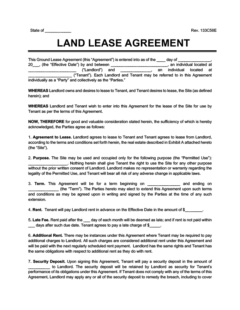Land Lease Agreement
A land lease agreement allows a person who owns a piece of land to rent that land to another person or company. Depending on the terms of the agreement, the rented land can be used for reasons such as:
- Farming and agriculture
- Land development (building restaurants, hotels, etc.)
- Commercial reasons (like putting up an advertisement next to a freeway)
€90,00
A land lease is an agreement between the owner of vacant land or property (the “landlord” or “lessor”) and an individual or entity who wants to develop or improve the property (the “tenant” or “lessee”). It’s also known as a:
- land agreement
- ground lease
The lease is for the right to occupy real estate comprised of only dirt and soil, so the land could be used by the tenant for multiple uses ranging from agricultural to residential or commercial purposes.
Agricultural land leases can include the use of land as a farm for crops and orchard trees, as a ranch for hunting wild game and forest animals on the premises, or as a pasture for grazing animals like cattle, goats, and sheep.
Commercial land leases can vary from the right to install a billboard, build a telecommunications tower (i.e. used for wireless cell phone reception), open a fast-food chain restaurant, or develop a large multi-story hotel complex.
Residential land leases can include a spot in a trailer park or the right to construct a small cabin in the woods.
A simple land lease should generally have at least the following:
-
- Who are the parties to the land lease (i.e. the landowner lessor and the tenant or lessee)?
- What is the amount of rent being paid by the tenant? (often depends on the length of the lease, amount of land/acres used, and intended use of the land)
- Where is the vacant land or real estate located or which portion is being leased? (use a legally recognized description for the property like metes-and-bounds, photographs, diagrams, or a detailed description in words)
- When will the lease end? (i.e. after a fixed set of years or if a condition or event occurs)
- Whether the landlord may keep any improvements or reimburse the tenant
- Why the tenant can use the land? (a description of the permitted uses of the land)
- How will the rent be paid? (usually either on a monthly rent, lump sum payment at the beginning of the lease, or based on the yield of crops, such as crop share rent or sharecropping)
What else should be included?
-
- Access: confirm whether the landlord will still retain the right to enter the land at certain times for special reasons and detail possible gates or roads the tenant may use
- Amendment: state whether future changes to the agreement must be in writing
- Choice of Law: determine which state’s laws will be used to resolve any legal disputes
- Disputes: describe if disputes will be handled by mediation, arbitration, or court litigation
- Duration: specify the term of the lease, including any renewal options, possible extensions, or notice requirements. Be sure that leases lasting one year or more are in writing to satisfy the Statute of Frauds in most states
- Facilities: detail whether the tenant is allowed to use certain pre-existing amenities or structures on the property such as a barn, shed, or camping area
- Gate Requirements: if the property contains livestock like cattle or sheep that graze on the pastures, the landowner may require the tenant keep all gates closed at all times to reduce the possibility of livestock being injured or dying, or a third party is harmed
- Government Regulations: clarify which party must ensure use of the land does not violate zoning laws and who should obtain the necessary licenses or permits
- Improvements: state whether the tenant needs the landlord’s written permission to build improvements or make alterations on the land, and whether the landlord can keep the improvements
- Insurance: detail what types of insurance the tenant must carry and maintain
- Liability: discuss whether the tenant must buy liability insurance for the property and whether the landlord will be released from being responsible for any harm or damages that may occur on the property during the tenant’s lease
- Maintenance: address whether the property owner or the tenant is responsible for maintaining the land in a certain condition, including the tenant’s duties and obligation to not commit waste or engage in activities that would decrease the value of the land
- Mineral or Subsurface Rights: clarify whether (or at what price) the tenant has rights to access natural resources like precious minerals, natural gas, or oil located underneath the surface of the property
- Mortgages: Whether the tenant can mortgage its leasehold interest and/or the landlord’s interest in the property
- Permits: designate which party is responsible for obtaining necessary permits and approvals
- Subletting: state whether or not the tenant can sublet the land
- Utilities: whether the landlord or tenant is responsible for supplying electrical power, water, sewage, roads, or any other basic necessities needed to use the property
- Security Deposit: the landowner may ask for additional money as security for possible damages to the property incurred by the tenant during their occupancy
- Severability: state that if one section of the agreement is unenforceable, other parts of the lease will independently continue to be in effect
- Surrender: describe the condition the land must be in when the tenant leaves, and how
- Taxes: determine who must pay for related local, state, or federal taxes for the proposed use of the land
- Termination: detail how and whether the landlord and/or the tenant may end the agreement, usually because of a breach like failure to pay rent or maintain the land
- Use of Motorized Vehicles: clarify whether and/or where the tenant is allowed to use certain vehicles like all-terrain vehicles (ATVs) (i.e. quad bikes, three-wheelers, or four-wheelers) on the property
As a reference, a land lease is known by various names depending on the intended use of the land or real estate:
- Ground Lease Agreement
- Billboard Land Lease Agreement
- Cash Farm Lease Agreement
- Crop Share Cash Farm Lease
- Farm Land Lease Agreement
- Hunting Lease Contract
- Land Contract
- Land Lease Agreement
- Pasture Lease Form
- Pasture Rental Arrangement
Land Lease Agreement PDF Sample
The sample land lease agreement below details an agreement between the landlord, ‘Gary E Chapell’ and the tenant, ‘Marjorie H Calhoun.’ Gary E Chapell agrees to lease the site to Marjorie H Calhoun for the purpose of operating and managing a multi-family residential apartment complex.
When Do I Need a Land Lease?
Individuals who purchase or inherit vacant land in either an urban or rural setting may benefit from a land lease if they want to generate some passive income without the hassle of personally investing the capital, labor, or time needed to build structures and start an independent business.
In rural communities, tenant farming is common for agricultural or hunting purposes. In these situations, a tenant may have tools or livestock and enough funds to pay for the right to use land, but lack the capital to purchase his or her own parcel of land.
In addition to raising crops or livestock, landowners with large properties in the countryside may profit from leasing their property to a hunter or association during hunting season. In addition to earning a seasonal income, a Ground Lease to hunt on uninhabited land may help prevent crop damage and disease in livestock by managing wildlife in the area according to The National Agricultural Law Center.
In urban settings, a land lease is often used by large chain stores who want to take advantage of a prime location without having to pay large sums for the underlying real estate. Corporate expansion plans may leverage land leases as a way of strategically using equity or available cash to improve the land to generate income instead of purchasing property. And land owners can generate steady income every year, and possibly inherit any structures or improvements built on the land when the lease ends.
Without a land lease reduced to writing, each parties’ rights may not be protected if a disagreement blossoms into a lawsuit. Instead, a written agreement can help clarify nuanced details like the following in advance:
- Who is supposed to pay real estate taxes?
- Who is responsible for an animal causing damage on neighboring property?
- Who needs to obtain the necessary agritourism or recreational land use permits?
- What should happen if mineral rights are unexpectedly discovered on the land?
- Is there a late fee or penalty for not submitting rent on time?
- Will the landlord be able to keep any structures built on the land after the lease ends?
- Can the tenant sublease the land to another farmer or developer?
The Consequences of Not Using a Land Lease
Documenting the agreement prevents outsiders from mistaking the land arrangement as a joint business venture instead of an independent landlord-tenant relationship. A tenant often incurs debt when they take out a loan to make improvements on the loan. A land lease can explicitly include a “No Partnership” clause that protects the landlord from creditors who may try to come after the property owner for debts or financial obligations owed by the tenant.
Subordinated vs. Unsubordinated
Of note, a land lease can either be subordinated or unsubordinated depending on how the agreement is documented.
- In a subordinated land lease, the property owner agrees to take a lower hierarchy in its claim of ownership and pledges its interest in the land as collateral for the tenant’s loan to build improvements. If the tenant defaults on the loan, the landlord would lose its ownership of the land. Often time banks do not want to lend tenant’s the large sums of money needed to construct improvements because they are not receiving a security interest underlying land itself. Landlords usually agree to subordination in exchange for higher rent payments.
- In an unsubordinated land lease, however, the landlord refuses to take a lower hierarchy and prohibits the tenant from pledging its title to the land as collateral for any loans. If the tenant defaults, the landlord gets to keep their ownership of the land, while the tenant may lose its leasehold interest. Unsubordinated leases usually come with lower rent payments.
Finally, an agreement in writing protects future disputes between two parties who file a lawsuit to quiet title in a claim for adverse possession when there is confusion as to who owns the land.
For example, Owen the landowner may have allowed Tim the tenant to farm the land without an agreement. Fifteen years later, Tim claims that he owns the land, while Owen argues that he is the actual property owner. Instead, Owen should have confirmed in writing that Tim is a tenant with permission to occupy the land, thereby eliminating the “hostile” requirement needed for an adverse possession claim.
Specificaties: Land Lease Agreement
|
User Reviews
Plaats de eerste recensie voor “Land Lease Agreement”
Informatie verkoper
- Nog geen beoordelingen!

























Er zijn nog geen recensies.